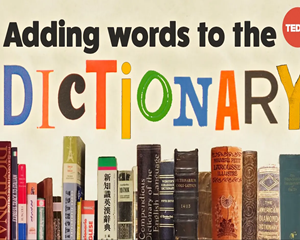"Dictionary:" noun, "a malevolent literary device for cramping the growth of a language and making it hard and inelastic."
“词典”:名词,“一种恶意的文学手段用以限制语言的发展,并让其变得困难死板。”
"Lexicographer:" noun, "a writer of dictionaries; a harmless drudge."
“词典编纂者”:名词,“一位词典的作者,一位无害的苦力。”
While the concept of a dictionary dates back to ancient civilizations, the first English dictionary was published by Robert Cawdrey in 1604.
词典的概念可追溯至古文明时期,但直到1604年,罗伯特·考德雷第一本英语词典才出版面世。
In the centuries that followed, many more dictionaries were written by individual authors who chose what to include or exclude.
接下来的几个世纪,越来越多的词典由独立作者自行删选、编撰完成。
They not only defined words, they openly showcased their creators' opinions -- like Ambrose Bierce's definition of "dictionary" and Samuel Johnson's definition of "lexicographer."
他们不仅定义单词,同时也展示自己作为创造者的想法--比如上述安布罗斯·比尔斯对“词典”的定义和塞缪尔·约翰逊对“词典编纂者”的定义。
After their authors deaths, many of these dictionaries quickly became outdated. But one 19th century dictionary had a different fate.
在这些词典的作者逝世后,许多词典很快就过时了。但是一本于19世纪诞生的词典却有着不同的命运。
In 1828, American lawyer and author Noah Webster published "An American Dictionary of the English Language" with a lofty goal:
在1828年,美国律师兼作家诺亚·韦伯斯特出版了“一本美国的英语词典”,他有着一个崇高的目标:
to give the United States its own version of the English language.
对英语,给出美国自己的理解版本。
He believed that as a new nation, the United States needed its own distinct version of English to assert its independence from Britain.
他相信作为一个新的国家,美国需要拥有自己的与众不同的英语词典以维护美国独立于英国的地位。
In his dictionary, Webster sought to describe and officialize the way Americans spoke.
在他的字典里,韦伯斯特试图描述并官方化美国人说话的方式。
Most dictionaries in Webster's time were prescriptive: they dictated how words should be used,
韦伯斯特时期的大多数字典通常具有规范性:他们规定了应该如何运用这些词语,
rather than documenting the way people actually used language in daily life.
而非记录日常生活中人们实际是如何使用这些词语的。
When Webster broke this convention and included slang words in his dictionary, critics accused him of polluting the English language.
当韦伯斯特打破这一常规,在自己的字典里加入俚语,批评家们指责他玷污了英语。
But he argued that these words captured local variations of language -- a vital part of what made American English unique.
但他反驳到这些单词捕捉了英语的本土化--这是使美式英语独一无二的一个重要部分。
He also believed spelling rules were unnecessarily complex, and that we should write the way we speak as much as possible.
他同时认为拼写规律过分复杂,我们应该尽可能按照口语习惯进行书写。
Still, Webster's own opinions influenced the words he included and the way he defined them.
然而,韦伯斯特的观点对他本人选入的词语以及定义方式产生了影响。

He excluded slang words from Black communities because he didn't consider them proper.
他删去了黑人社区流传的俚语,因为他认为这些俚语不合适。
And when he defined "woman," he added that "women are soft, mild, pitiful, and flexible." By the time of his death, Noah Webster was a household name.
他在定义“女人”时,他又附上“女人是柔软的,温和的,可怜的和灵活的”。到他逝世的时候,诺亚·韦伯斯特成了一个家喻户晓的名字。
Seeing a lucrative business opportunity, brothers George and Charles Merriam bought the rights to Webster's Dictionary.
梅利亚姆兄弟发现了一个利润丰厚的商机,买下了韦氏字典的版权。
Together with Webster's son-in-law, the Merriams made a new, revised edition. It was the beginning of the Merriam-Webster Dictionary.
和韦伯斯特的女婿一起,梅里阿姆家族编撰了一本新的修订版词典。这就是韦氏词典的开始。
Today, the Merriam-Webster Dictionary begins to address a contradiction in Webster's goal:
如今,韦氏词典开始向着与韦伯斯特初衷相反的方向发展了:
he wanted to represent an entire nation, but he based his work on just one person's opinion: his own.
韦伯斯特想要代表整个国家,但是他只凭借一个人的观点进行编撰:他自己的观点。
Since Webster's death, each new edition of the dictionary has been curated by a group of language experts rather than by a single authority.
自韦伯斯特逝世以来,词典的每一个新版都由语言专家组,而非单一权威,进行编写。
The current criteria for including a word in the dictionary are that it has "widespread, sustained, and meaningful use."
一个新单词入选词典的标准是这个新单词有:“广为流传的,可持续的以及有意义的用途。”
This clearly includes profanities, which were sometimes excluded from dictionaries in the past.
这一标准显然包含了不雅词汇,而这按照过去的标准有时是要被剔除的。
Racial slurs also meet the criteria for inclusion, but some argue that including them might legitimize them.
种族歧视的用词也符合纳入标准,但是一些人认为纳入这些词语意味着将它们合法化。
Dictionaries don't just add new words -- they also redefine old words to reflect changing attitudes and usage.
词典并不仅仅是加入新词--它们也会根据态度与用法的变化对旧词进行重新定义。
One 1736 dictionary defined "wife" as "a married woman whose will, in the judgment of the law, is subject to the will of her husband: for which reason a wife is said to have no will."
一本1736年的词典里把“妻子”定义为“一位成婚的女人,她的意志,依据法律的判断,需服从于她丈夫的意志:基于这一点,一位妻子没有个人意志。”
Today, "wife" is defined simply as "a female partner in a marriage." In 2019, Merriam-Webster's word of the year was "they."
如今,“妻子”仅仅被简单定义为“婚姻中的女性合伙人。”在2019年,韦氏词典的年度单词是“他们”。
The word has been in regular use for centuries, but has only recently gained a new recognized meaning, as a pronoun for one person whose gender identity is nonbinary.
这个单词已经日常使用了好几个世纪,但是直到最近它才有了一个新的公认含义:代词,指代一个性别非二元的人。
The question of which words belong in the dictionary impacts all of us -- when our words and definitions are represented, they're affirmed; if not, they -- and we -- are minimized.
词典纳入哪些单词影响着我们所有人--当词语和它们的定义被纳入词典,它们就被肯定了;如果没有被归入词典,这些词和我们便被轻视了。
Today, lexicographers have expanded word sourcing to include the dictionary's users: tracking which words are most searched, and adding them to the dictionary.
现在,词典编纂者扩大了词语来源,例如囊括词典的使用者:追踪搜索次数最多的用词,把它们加到词典里。
So, who decides what's in the dictionary? More than ever before the answer is: we do. All of us shape language every day.
那么,谁能决定词典的内容呢?最终的答案是:我们。我们所有人每一天都在对语言进行改造。
When we collectively embrace one word or redefine another, eventually, those words and meanings are reflected in our dictionaries.
当我们共同接受一个单词或者重新定义一个单词,最终,这些词语和定义都会在我们的字典里得以反应。


